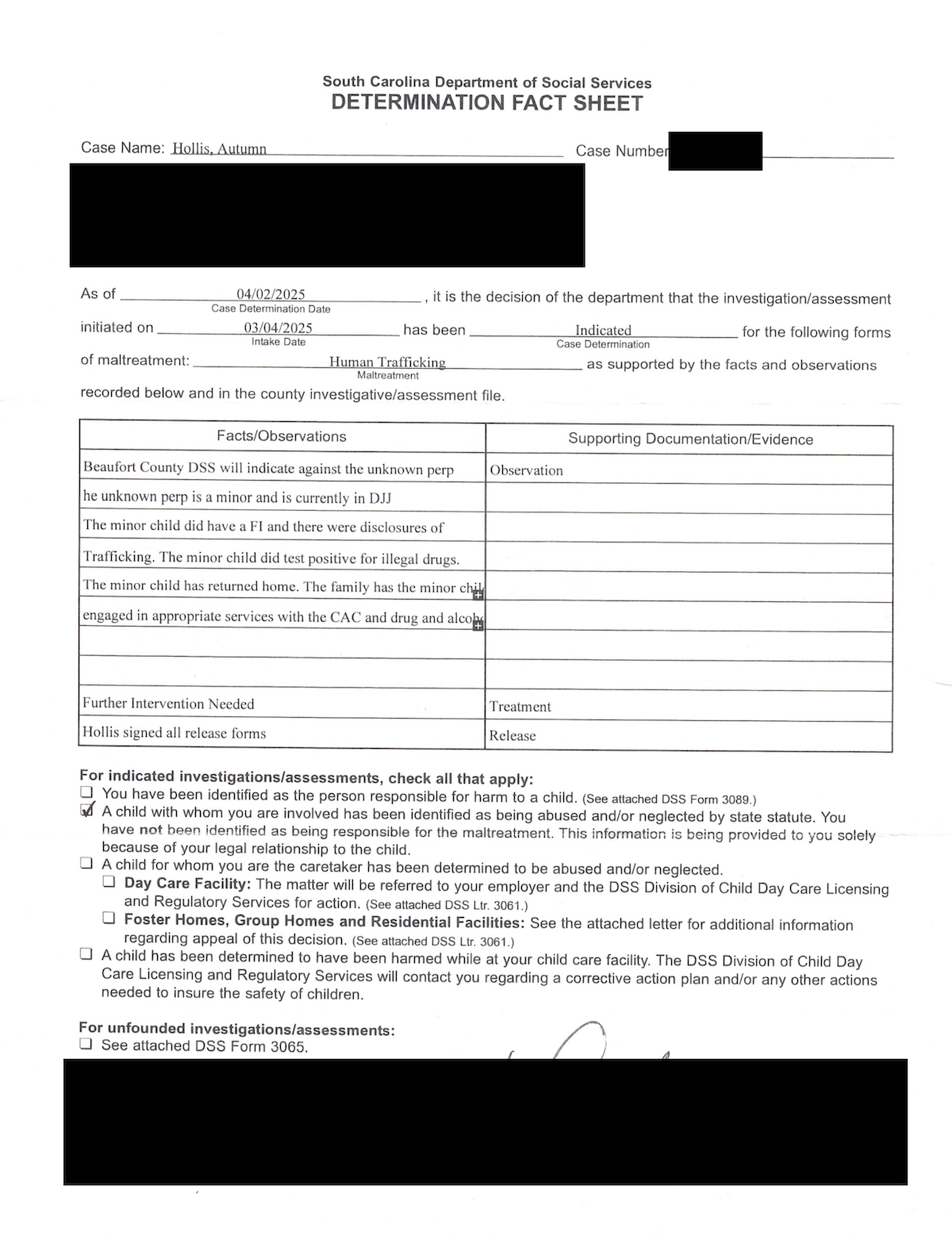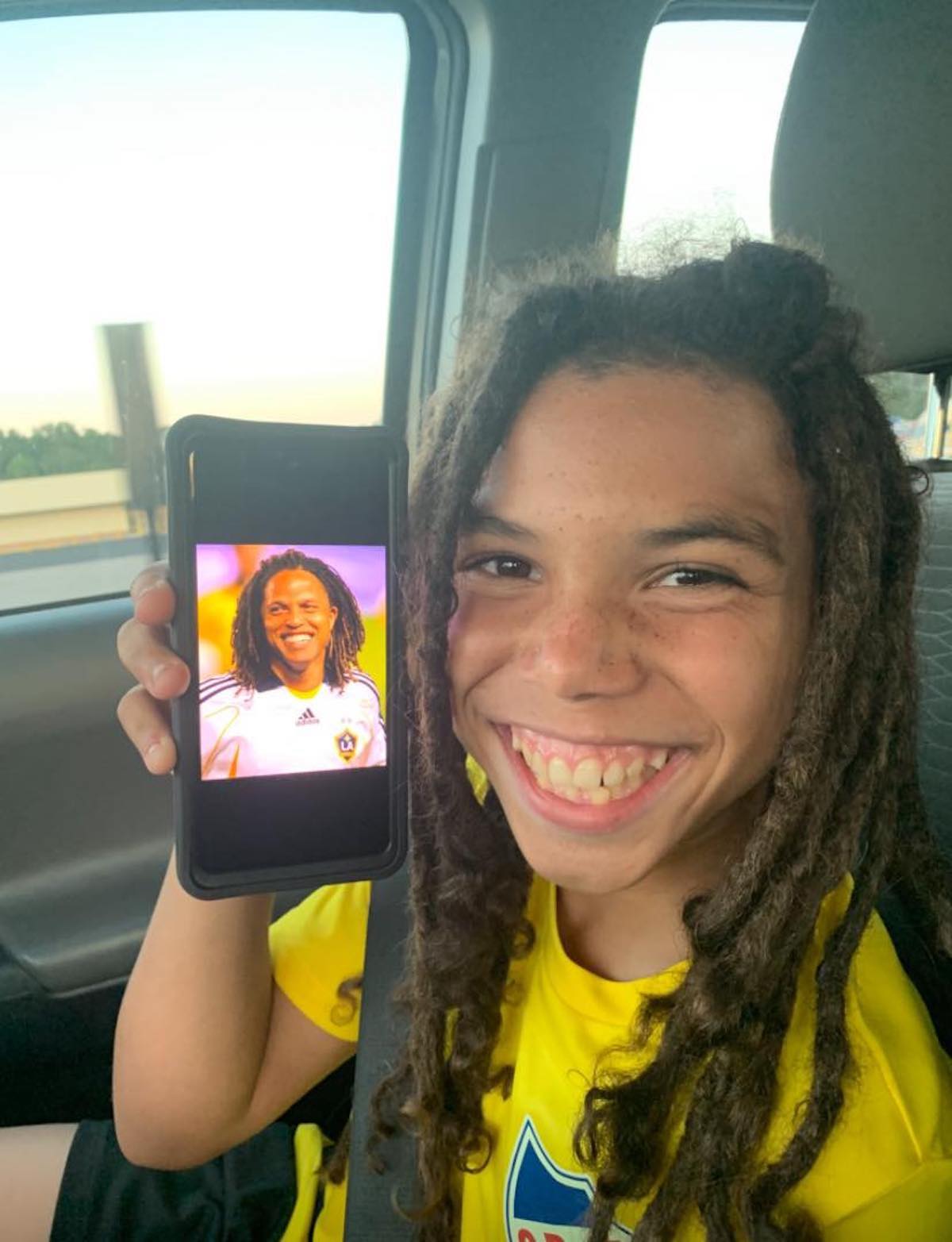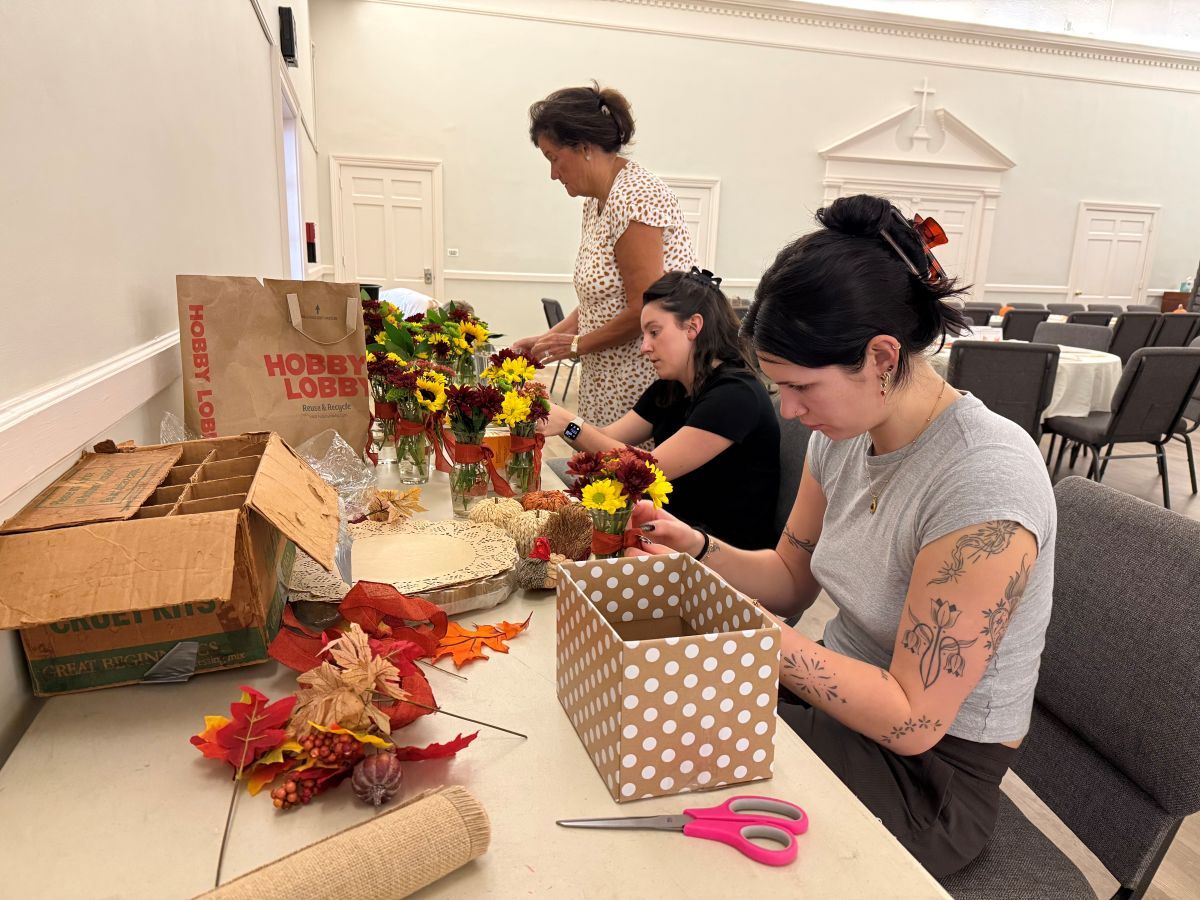By Delayna Earley
The Island News
Months after a Beaufort preteen went missing for several days, it has been determined through an investigation by the South Carolina Department of Social Services (SCDSS) that she was likely the victim of human trafficking.
It has been three months since 12-year-old Emily Hollis disappeared from her parents’ home in Beaufort, an event that sparked a heated online discourse regarding the usage of the term “runaway.”
What happened
In February 2025, Hollis was reported as a runaway by the Beaufort Police Department after she went missing from her home and was known to be in the company of 16-year-old Chase Eskeets.
Eskeets and Hollis were reported as runaways by the Beaufort Police Department based off the evidence found at the scene and known evidence, according to Lt. Lori Evans with the police department.
According to Hollis’ parents, she had met Eskeets on Snapchat about two weeks before she disappeared while using a phone that was given to her by one of her friends, information that was not made aware to them until after she had been safely returned home.
The youths were found in Jacksonville, Fla., after several days, but not before the community expressed outrage toward the police department’s labeling of Hollis as a runaway given her age.
The Hollis family was contacted by South Carolina Law Enforcement Division Special Agent Logan Fey, who assisted them by putting them into contact with SCDSS, a common practice with runaway or missing children’s cases.
After interviewing all the involved parties, including several hour-long interviews with both parents, SCDSS sent a letter to the Hollis family saying that based on their findings, their case had been indicated for human trafficking.
The Determination Fact Sheet, which is a form sent to parties with the findings from an investigation with SCDSS, states that Beaufort County DSS will “indicate against” the perpetrator.
SCDSS conduced a forensic interview with Hollis, and in the interview, she made disclosures of trafficking, according to the Determination Fact Sheet.
According to her parents, Hollis received a phone from a friend after hers was taken away as a punishment for an unrelated incident.
The phone, which was not known to her parents, had the popular social media app SnapChat on it, which is what Hollis used to begin communicating with Eskeets.
During the time they communicated, Eskeets allegedly spoke to Hollis about leaving home and 15 days after they became friends on SnapChat they left Beaufort.
“From what she’s telling us, he was doing the whole schmoozy, ‘you know everybody hates you. You’re not meant for this town. Your friends aren’t … whatever,’” said Kiel Hollis, Emily’s father. “We grounded her, so of course she was angry. She’s angry about that, and when she got that separate phone, she was able to get SnapChat and see all her friends going out, having fun, and she was getting lonely. She was getting jealous. She was getting sad. She became vulnerable.”
He said it created a depression that made her an easy target.
The report also lists that she tested positive for illegal drugs.
Report only raises more questions
What were not included with the Determination of Facts from SCDSS, were any answers as to what this means for Hollis, if legal action was going to be taken or what the next steps were.
Upon receipt of the Determination Fact Sheet from SCDSS, the Hollis family contacted the Beaufort Police Department, who told them they no longer had jurisdiction over the case as it had been handed over to the Jacksonville, Fla., Sheriff’s Office.
“The case was reviewed by Beaufort Police Department with South Carolina Law Enforcement Division (SLED) and found that if any incident of human trafficking occurred, it occurred outside our jurisdiction and was referred to the appropriate agency, Jacksonville, Fla., Sheriff’s Office,” said Lt. Lori Evans with the Beaufort Police Department.
This answer raised questions with the Hollises as they had been told by Special Agent Fey by text shortly after receiving the letter from SCDSS that “SLED is not actively working [the] case. It’s still being handled by the locals because it was not relinquished by their agency or the Solicitor’s office.”
“We assisted with getting them in touch with Jacksonville and necessary partners to cross report the incidents down there,” Fey said.
Additionally, the Hollises raised the question how can it be determined that “any incident of human trafficking” occurred outside of Beaufort County, when their daughter was here in Beaufort when the conversations over SnapChat — where they alleged their daughter was groomed into leaving home –took place, therefore making the origin of the alleged crime Beaufort County.
When contacted by The Island News to ask if the investigation conducted by SCDSS could lead to further investigation and potential charges related to human trafficking, Lt. Evans said that “DSS reports disclosures from the juvenile. If trafficking was disclosed to DSS it was documented on their referral information sheet, but DSS does not have the authority to define or charge the elements of an offense.”
The Hollises also said that they have been told that their case should have been sent directly to the S.C. Attorney General’s office, which handles human trafficking cases in the state, but Kathryn Moorehead, the director of the South Carolina Human Trafficking Task Force Criminal Division confirmed by email with The Island News that as of Tuesday, May 20, “this case does not involve [their] office” and questions should be directed to SCDSS and local law enforcement.
‘Let it play out’
Beaufort City Councilman Josh Scallate said that he believes that at this point the agencies involved should be allowed to let the processes play out.
In February 2025, all members of Beaufort City Council signed and published an open letter to the community – a rare occurrence — responding to the outcry against the police department for using the term “runaway.” In the letter, members of Council offered their support to the police department for handling the case in the manner that they did.
Now that there’s an indication that Emily Hollis was trafficked as opposed to a “runaway,” nobody seems to want to talk about it.
Despite seeing a little light at the end of the tunnel, the Hollises said they are exhausted with the run-around they have been getting from the various agencies they have dealt with since this ordeal began.
They have not been able to get any straight answers, and the answers they have been able to get have contradicted each other, leaving them with a lot more questions and very few answers.
“I never want to make the police look bad,” said Autumn Hollis, Emily’s mother. “Believe me when I say we only want change. This is an issue concerning our entire nation. Like we have stated multiple times, over multiple interviews and podcasts, our story is not unique. The police action, or lack thereof, happens all over the U.S. Parents need to understand this is the reality if your child is labeled a runaway. Time is of the essence. According to the National Network for Youth, one in five runaway and homeless youths are victims of human trafficking. With an estimated 2,300 missing children per day in the U.S., that’s more victims than anyone would care to think about. That’s a lot of victims police are not putting the resources into looking for them as they would a ‘missing child.’”
The Beaufort Police Department maintains that “resources are relatively the same when it comes to a missing person or runaways.”
“We issue local BOLOs (Be on the Lookout), share information with other entities across the state and nation via a national database,” said Lt. Evans. “If a sighting or last known location is known, the law enforcement agencies in that area are directly notified as was done in this case.”
Autumn Hollis said that her family just wants to make sure that in the future, families are not made to endure what they have and are given the proper support in finding their child and bringing them home.
Delayna Earley, who joined The Island News in 2022, formerly worked as a photojournalist for The Island Packet/The Beaufort Gazette, as well as newspapers in Indiana and Virginia. She can be reached at delayna.theislandnews@gmail.com.
Keywords: Delayna Earley, The Island News, Beaufort, SC, South Carolina, Port Royal, Ladys Island, Lowcountry










